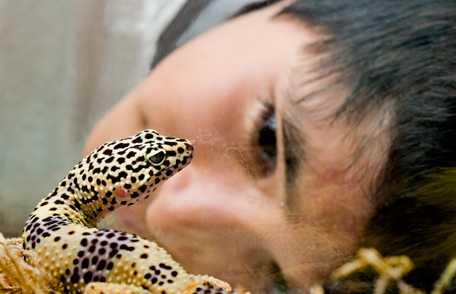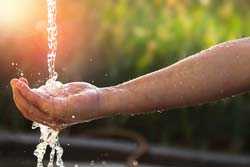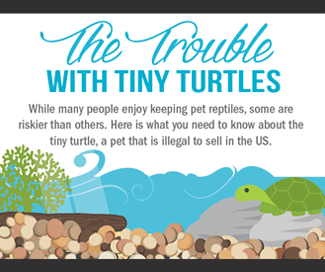Take Care with Pet Reptiles and Amphibians
 Healthy reptiles and amphibians can carry Salmonella and other germs that make people sick—especially young children. Take steps to keep you and your family healthy!
Healthy reptiles and amphibians can carry Salmonella and other germs that make people sick—especially young children. Take steps to keep you and your family healthy!
Many people think that Salmonella infections are caused only by contaminated food, but you can also get infected by handling reptiles, which include turtles, lizards, and snakes, and amphibians like frogs, and salamanders. You can get infected from reptiles and amphibians in your household even if you don’t touch the animals because Salmonella germs in droppings (feces) can contaminate anything they touch, including anything in their environment like aquariums and food dishes.
If there are young children in your home, consider pets other than reptiles or amphibians for your family.
In 2015 and 2016, more than 202 people were sickened in several ongoing, nationwide Salmonella outbreaks linked to small turtles. Forty-one percent of patients were children younger than 5 years. Some people in these outbreaks became sick even when they did not touch the turtles, but had turtles in their households. From 2006 to 2014, CDC investigated 15 multistate Salmonella outbreaks linked to turtles; 921 people were sickened, 156 were hospitalized, and an infant died. In 2011, CDC investigated an outbreak linked to African dwarf frogs; 241 people were sick and sixty-nine percent were younger than 10 years of age. These illnesses and outbreaks are why CDC recommends that turtles and other reptiles should not be kept as pets in households with young children. [775 KB]
Animals and Health
Check out two CDC websites with helpful resources.
- Healthy Pets Healthy People: Information on health benefits of pets and disease risks.
- Gastrointestinal (Enteric) Diseases from Animals: Information about zoonotic outbreaks, prevention messages, and helpful resources.
Safe Handling Tips for Reptiles and Amphibians
- Always wash your hands thoroughly after handling reptiles and amphibians, and anything in the area where they live or roam such as their habitats, food, or equipment.
- Children younger than 5, people with weak immune systems, and adults older than 65 should not handle or touch amphibians, reptiles or their environment. These groups have a higher chance of serious illness and hospitalization from Salmonella germs.
- Don’t cross-contaminate! You don’t have to touch a reptile or amphibian to get sick from their germs. Any reptile food such as frozen or live rodents, equipment, and materials, including the tank water, can be contaminated with Salmonella and other germs.
- Keep your reptiles and amphibians and their equipment out of your kitchen or anywhere food is prepared, served, or eaten.
- Clean reptile and amphibian habitats outside your home.
- If you cannot clean items outside of your home, clean items in a dedicated bin and use warm, soapy water to clean the bin and any surfaces it touches.
- Don’t kiss or snuggle with reptiles and amphibians.

Always wash your hands thoroughly after handling reptiles, amphibians, and anything in the area where they live or roam.
Choosing a Reptile or Amphibian Pet
- Don’t buy turtles less than 4 inches in length (about the size of a deck of cards or a cell phone). Federal law bans the sale of these small turtles, even though they might be sold in souvenir shops and at roadside stands. If you want to have turtles as pets, buy turtles with shells longer than 4 inches from a trusted pet store.
- Don’t catch wild reptiles or amphibians and keep them as pets.
- Don’t release unwanted reptiles or amphibians into the environment. This isn’t good for the animal or for the environment. Call your local reputable pet store or a reptile rescue.
- If you decide to get a pet reptile or amphibian, talk with your veterinarian about the housing and feeding needs to ensure this type of commitment meets your family’s expectations and abilities.
- For other information on choosing and handling reptiles visit: https://www.cdc.gov/healthypets/pets/reptiles.html
More Information
More Information
For the Pet Owners
- Poster: Reptiles and Amphibians and Preventing Salmonella Infections
- English: After you touch amphibians or reptiles, wash your hands so you don’t get sick! [618 KB]
- Spanish: Si toca anfibios o reptiles, ¡lávese las manos para no enfermarse! [629 KB]
- French: Lavez vos mains, après avoir touché des amphibies ou des reptiles, pour ne pas tomber malade! [623 KB]
- Chinese: 為了避免生病, 在接觸兩棲或爬行動物之後請洗手![710 KB]
- Turtles Kept as Pets
- Safe Reptile Handling
- Podcasts
- CDC Kidtastics: Water Frogs, Aquariums, and Salmonella—Oh My! [PODCAST – 4:26 minutes]
- CDC Kidtastics: Don’t Kiss a Frog! [PODCAST – 3:50 minutes]
- En Español: ¡No beses al sapo!
- Salmonella from Baby Turtles
- Salmonella Infection and Water Frogs
For Public Health Professionals
- Digital Press Kit: Multistate Outbreaks of Human Salmonella Infections Linked to Small Turtles
- CDC Public Health Matters Blog: Tiny Turtle—Serious Health Threat
- CDC Warns that Water Frogs Can Make Your Child Sick [279 KB]
- Food and Drug Administration’s Center for Veterinary Medicine: Salmonella and Turtle Safety
Publications
- Notes from the Field: Four Multistate Outbreaks of Human Salmonella Infections Linked to Small Turtle Exposure — United States, 2015
- Turtle-Associated Salmonellosis, United States, 2006–2014 [1.13 MB]
- Notes from the Field: Update on Human Salmonella Typhimurium Infections Associated with Aquatic Frogs—United States, 2009-2011
- Compendium of Measures to Prevent Disease Associated with Animals in Public Settings, 2011 [1.33 MB]
- Page last reviewed: April 3, 2017
- Page last updated: April 3, 2017
- Content source:
- National Center for Emerging and Zoonotic Infectious Diseases
- Page maintained by: Office of the Associate Director for Communication, Digital Media Branch, Division of Public Affairs




 ShareCompartir
ShareCompartir
